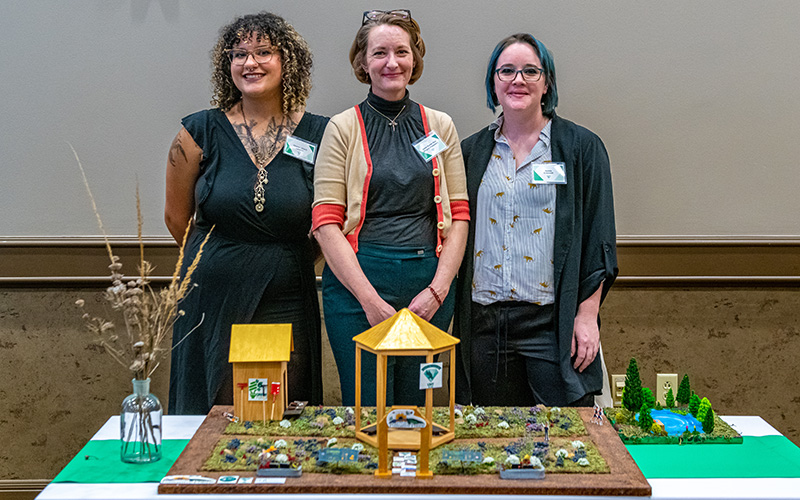
The UNT Diamond Eagles Society recently selected the UNT Pollinative Prairie to receive $77,500 in funding for a new expansion project that will enhance outdoor learning, conservation and community event opportunities at the four-acre site at UNT’s Discovery Park.
The funding will support the development of the Diamond Eagles Community and Learning Area, which includes construction of a large covered pavilion, observational dock, signage and an accessible walkway to offer a more enjoyable experience while visitors are learning, researching or simply relaxing at the prairie and adjoining pond.
The UNT Diamond Eagles Society is a network of passionate donors, alumni and friends of the University of North Texas who collaborate to create high-impact change on campus. Established in 2017, the society has funded five past projects, including the Diamond Eagles Family Patio, the digitization of the Texas Fashion Collection and the Diamond Eagles Garden at Mean Green Acres Hydroponic Farm.
Established in 2016 as a student-funded We Mean Green Fund project, the UNT Pollinative Prairie is already utilized by 500 students every semester, giving hands-on experience to those interested in studying sustainable urban landscaping and native conservation.
Dr. Jaime Baxter-Slye, an instructional laboratory supervisor and adjunct lecturer in the UNT Biological Sciences Department, has been the staff advisor for the Pollinative Prairie since its inception. She also led the charge on this most recent project proposal, which was presented in partnership with the UNT College of Engineering and the College of Science. Dr. Michael Thompson, principal lecturer in the Department of Philosophy and Religion, is the co-advisor for the project.
“The UNT Pollinative Prairie Committee and our team from the College of Science and College of Engineering are thrilled to build the Diamond Eagles Community Learning Area!” Baxter-Slye says. “The pavilion, walkway and dock will provide better access and shade to all who would like to enjoy this wonderful nature area. We can't wait to provide tours and hold classes under the pavilion. Thank you very much to the Diamond Eagles for your support and partnership!”
UNT alumnus Jeffrey McLeod (’15), a Diamond Eagles Society member, says he and his wife enjoy being able to support projects that positively impact the campus and Denton community, which they have been part of since 2003.
“My wife and I value the University of North Texas and what it represents in the Denton community environmentally, creatively and educationally,” McLeod says. “The Diamond Eagles Society is my way of saying thank you. I believe the organization sets an example for current students and the part they can play in ensuring the university continues as a first-class research institution. It also is an extension of the culture and values that I believe I share with the institution.”
The Pollinative Prairie has earned accolades and certificates from the UNT Office of Sustainability, the Monarch Watch Waystation, Audubon on Campus, the American Kestrel Partnership, Texan by Nature and the Xerces Society Million Pollinator Garden Project.
The new pavilion, walkway, signage and dock will be maintained by UNT Facilities and the existing Pollinative Prairie Committee, a student-led group of 28 undergraduates. All students on the committee are members of the UNT Society for Ecological Restoration, which has 120 undergraduate members who also volunteer at the Prairie.
The new additions to the Pollinative Prairie will ensure continued education and development opportunities for on-going research on sustainability and prairie restoration. The project is slated to begin construction by the end of the spring 2023 semester and will hopefully be complete by June 2024. Baxter-Slye says that future improvements may include trees along the path and seating areas near the pond.